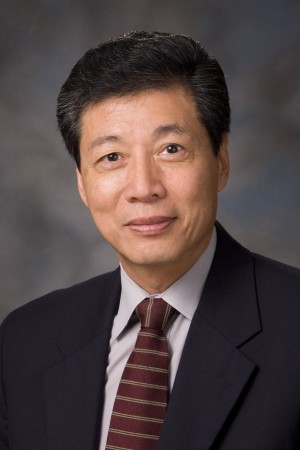Dr. Kian Ang, a prominent cancer doctor who helped popularize the M.D. Anderson Cancer Center tradition of ringing a bell at the end of  radiation treatment, died Wednesday. He was 63.
radiation treatment, died Wednesday. He was 63.
Ang, who pioneered practice-changing treatment for head and neck cancers, succumbed to cancer at M.D. Anderson, surrounded by family. He was diagnosed recently with the disease.
“Dr. Ang was the true triple threat – outstanding clinician, accomplished investigator and educator par excellence,” said Dr. Randal Weber, chairman of head and neck surgery at M.D. Anderson. “He was the guy who could do it all, what many of us aspire to be but fall short of.”
Colleagues at the University of Texas cancer center said Ang’s greatest achievements included pioneering work treating head and neck cancers with a combination of radiation and chemotherapy, particularly targeted therapies; and determining that cancers of the throat are more sensitive to treatment if caused by the human papillomavirus, or HPV, rather than smoking or drinking.
But Ang’s most lasting legacy may be his role in M.D. Anderson’s beloved bell-ringing customs. It dates to 1996, when one of Ang’s patients, a Navy admiral, told the doctor he wanted to employ the military branch’s tradition of ringing a bell to symbolize that “the job was done.”
The admiral brought to M.D. Anderson a brass bell, rang it several times and donated it to Ang and the staff.
It soon became popular with Ang’s patients, then throughout the cancer center.
Today, on any given day, five to 10 M.D. Anderson patients ring the bell, at the conclusion of their radiation treatment. In 2006, when M.D. Anderson built a mammoth proton therapy center, an Asian-influenced, advanced form of radiation, they included a gong for patients to ring.
In 2011, Ang was awarded the American Society of Radiation Oncology’s highest honor, its Gold Medal Award. He recently had been named vice president of M.D. Anderson’s Global Academic Program, a job that entailed orchestrating academic and educational collaborations between the Houston center and 26 leading cancer centers around the world.
Born in Indonesia on May 26, 1950, and educated at the Catholic University of Leuven in Belgium, Ang came to M.D. Anderson in 1984 and quickly embarked upon path-breaking research.
That included the rare feat of taking a drug from infancy in the laboratory to clinical trials.
“He literally wrote the book on radiation treatment for head and neck cancer,” said Dr. James Cox, former head of radiation oncology at M.D. Anderson.
“There were books before, but his was the most definitive, the most sophisticated in the last couple decades.”
Ang is survived by his wife, a son and daughter and their spouses and three sisters.
A memorial service at M.D. Anderson is being planned but not yet scheduled.
* This news story was resourced by the Oral Cancer Foundation, and vetted for appropriateness and accuracy.

Leave A Comment
You must be logged in to post a comment.